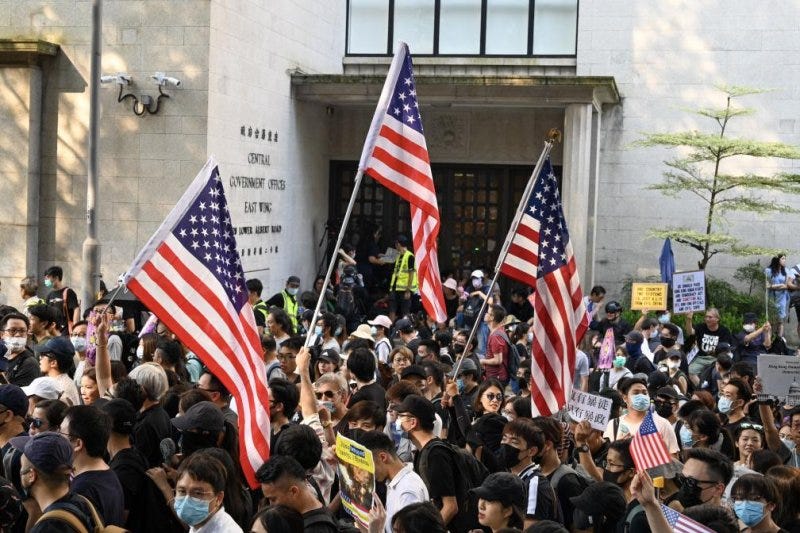American ideals matter in an age of rising authoritarianism
The true meaning of the fourth of July

On July 4th, 1776, fifty-six men signed their names to the Declaration of Independence.
The Declaration of Independence was many things. It was a list of grievances, a philosophical treatise, and even propaganda. But above all, it was an assertion that human beings deserved better than tyranny and that this was worth fighting for, potentially even dying for.
At the time, the ultimate fate of the future United States was not yet known. Perhaps the British would steamroll the revolution and hang all of the signers for treason against the King. It certainly couldn’t be ruled out at the time.
And the colonists who signed it were far from perfect. Many owned slaves. Some stole land from Native Americans. Most denied women any political voice. Yet the ideals they articulated would outlive their hypocrisies and create possibilities they themselves could not imagine, all leading us to today, 249 years later, as Americans light sparklers and watch fireworks burst over hometown parks.
But amid the fireworks is a stark reality — the work of the Declaration is incomplete. The world faces a renewed contest between freedom and tyranny. Authoritarian powers are continuing to perfect digital surveillance states and launch new wars of conquest. Most concerningly, this is all happening while many Americans struggle to see the difference between their own flawed democracy and the totalitarian alternatives rising across the globe.
This is more than just an unfortunate confusion and failure of perspective. Such “whataboutism” and false equivalence is a threat to the very foundations of liberal democracy when clarity about our values matters most.
As democracies face new threats, the choice between cynicism and faith in our founding principles has rarely been more consequential. This Fourth of July, understanding why the principles of 1776 still matter requires both honest reckoning with American failures and clear-eyed recognition of what we stand to lose if we give in to cynicism.
The power of principles
The founders who signed the Declaration knew tyranny firsthand. They lived under a system where the King’s word was law, where troops could be quartered in private homes regardless of how the homeowner felt, where saying the wrong thing could land you in prison, and where assemblies could be dissolved at will if the King didn't like their results. But even King George III’s abuses pale before what modern authoritarianism has achieved.
In Xinjiang, China has constructed what may be the most sophisticated surveillance apparatus in human history. AI-powered sensors monitor every digital communication, scanning for Quran verses and Arabic script. Facial recognition cameras process footage at checkpoints that appear every few blocks. And the totalitarian surveillance state is just a small part of it — more than a million Uyghurs have been detained in camps where survivors describe gang rapes, electric shocks, and forced sterilizations as routine, with hundreds of thousands of children forcibly separated from parents and placed in state “orphanages” for indoctrination, detainees used as slave labor, and even credible reports of forced organ harvesting.
Meanwhile, Russia under Putin has devolved into what can only be described as mafia governance. Opposition leaders face imprisonment or assassination. Independent media has been systematically destroyed. Expressing anti-war sentiments can lead to years in prison. Merely holding up a blank piece of paper as a protest is enough to get arrested. The Russian regime has launched an unprovoked war of conquest against Ukraine that has killed hundreds of thousands, while lying to its own people about the nature and cost of the conflict.
America has had many failings in the past and continues to have failings in the present. When the Continental Congress declared independence, critics on both sides of the Atlantic pointed out the colonists’ hypocrisies. How could slaveholders proclaim that “all men are created equal”?
The key difference is that when America fails, the mechanisms for exposure and correction exist — however imperfectly they function. When China commits genocide in Xinjiang, even mentioning it inside China risks imprisonment. In authoritarian regimes, the very idea of such critique is laughable.
This is the genius of founding a nation on ideals rather than blood or soil. The British could claim ancient tradition and royal prerogative. Americans have only principles. But these principles would prove more powerful than any dynasty.
When Frederick Douglass asked, “What to the Slave is the Fourth of July?” he didn't reject the Declaration — he demanded America live up to it.
When Elizabeth Cady Stanton drafted the Declaration of Sentiments at Seneca Falls, she didn't reject the Declaration but extended it — beginning with the words “all men and women are created equal.”
When Martin Luther King Jr. spoke at the Lincoln Memorial, he called not for America's destruction but for it to “live out the true meaning of its creed”.
These principles created what President Lincoln would later call something “constantly looked to, constantly labored for, and even though never perfectly attained, constantly approximated.”
The Authoritarian Challenge
Today's authoritarians understand the power of these ideals. And they are scared of them. This is why they work so hard to discredit them.
Chinese propaganda dismisses American ideals as hypocrisy while operating a vast network of detention camps. Russian disinformation highlights American racism while invading democratic neighbors. Iranian propaganda denounces American imperialism while violently suppressing women's rights protesters and executing political dissidents They all hope that by pointing out the gap between American ideals and reality, they can convince people that the ideals themselves are worthless.
This strategy unfortunately finds fertile ground among Americans who have grown cynical about their own country. Because America has real problems — persistent racial injustice, growing economic inequality, foreign policy failures — some conclude that American democracy is essentially no different from authoritarian regimes. This is a dangerously wrong false equivalence, and authoritarians feed on it.
Yet here's the profound irony these authoritarians hope we'll miss: I can write this essay criticizing American cynics, and they can respond by calling me naive or worse. We can have this argument publicly, vigorously, even angrily — and no one goes to a re-education camp. No one gets shot. No one is disappeared in the middle of the night. The most prominent critic of American “imperialism,” Noam Chomsky, built a 60-year career at MIT denouncing the US government. His Chinese or Russian equivalent would have vanished into a labor camp before tenure review.
What made the American founding revolutionary wasn’t moral perfection but institutional innovation. The Declaration didn't just list grievances against the King — it asserted that governments derive “their just powers from the consent of the governed.” The Constitution created checks and balances designed to prevent the concentration of power that enables tyranny. These mechanisms, however imperfect, have allowed for self-correction and moral progress in ways that authoritarian systems cannot match.
The Choice Before Us
This Fourth of July marks 249 years since a group of flawed men pledged their lives, fortunes, and sacred honor to an idea — that people could govern themselves better than kings could govern them.
Today we face a similar choice.
We can embrace a mature patriotism that acknowledges our failures while affirming our ideals, that criticizes in order to improve, that recognizes the genuine threats posed by rising authoritarianism and assigns due blame while avoiding false equivalence. Or we can sink into cynicism that sees no difference between imperfect democracy and efficient totalitarianism, between the aspiration to equality and the reality of oppression.
A reasonable patriotism today requires something harder than either blind faith or blanket cynicism — the ability to hold two thoughts simultaneously. Yes, America has failed to live up to its ideals. And yes, the gap between American democracy and authoritarian alternatives remains vast and morally significant.
The founders’ true insight wasn't that they created a perfect system, but that they created a system capable of improvement. They built in mechanisms for change — amendments, elections, courts, federalism. The question isn't whether America has problems to solve but whether you’d rather solve them through democratic politics or have them “solved” by an authoritarian strongman.
A reasonable patriotism also means rejecting both extremes of the current moment. It means you can love your country without worshipping it, criticize it without hating it, and recognize that the American experiment — however flawed in execution — remains humanity's best attempt at organizing society around human dignity rather than raw power. In an era when that experiment faces genuine threats, such clarity isn’t just intellectually honest, it’s essential.
When protesters in Hong Kong waved American flags while facing Chinese crackdown, they weren't endorsing every American policy. They were recognizing what the principles of 1776 represent in a world of narrowing possibilities. When Ukrainian soldiers carry flags signed by American supporters, they're acknowledging what the American experiment means for human freedom. Today, on July 4th, I ask every American to consider the same.
The signers of the Declaration of Independence didn’t know if their experiment would survive King George’s retribution. They signed anyway. Today we know democracy can work — we’ve seen it lift billions from poverty, spark the digital revolution, and create cultures that captivate the world. The question isn't whether America has failed to live up to its ideals — of course it has. The question is whether those ideals remain humanity’s best tool for building flourishing societies and whether those ideals are worth defending. Look at where refugees flee to, not from. Look at which values activists invoke when demanding better. Look at whose flag Hong Kong protesters wave.
The answer is obvious.
Happy Fourth of July.






"Expressing anti-war sentiments can lead to years in prison"
Link appears to be broken.
"This is the genius of founding a nation on ideals rather than blood or soil. The British could claim ancient tradition and royal prerogative. Americans have only principles."
Americans have principles, blood and soil. See for example Federalist paper 2
"With equal pleasure I have as often taken notice that Providence has been pleased to give this one connected country to one united people--a people descended from the same ancestors, speaking the same language, professing the same religion, attached to the same principles of government, very similar in their manners and customs, and who, by their joint counsels, arms, and efforts, fighting side by side throughout a long and bloody war, have nobly established general liberty and independence. "
or the commonly used phrase
"from sea to shining sea"
If anything I would argue that for example Communist China's founding was far more about principles rather than blood and soil than America's founding and the same is true for theocracies like Iran. (Yes, I prefer the american system.)